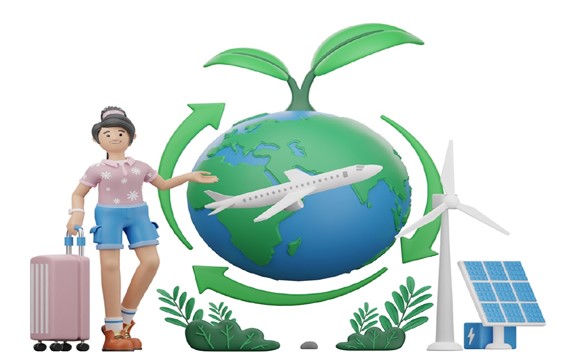
The United Nations World Tourism Organisation (UNWTO) defines sustainable tourism as tourism that, in meeting the needs of visitors, the industry, the environment and local communities, takes full account of current and future economic, social and environmental impacts.
Tourism sustainability refers to several types of sustainability: ecological, socio-cultural and economic. Sustainable tourism must make optimal use of environmental resources, respect the socio-cultural values of the areas visited and ensure well-distributed economic benefits that contribute to poverty reduction.
According to the UNWTO, tourism has experienced continuous growth and diversification and is a driver of socio-economic progress. The UNWTO, which is currently composed of 156 countries, plays a key role in promoting the development of responsible, sustainable and accessible tourism for all, paying special attention to the interests of developing countries, taking into account the 2030 Agenda for Sustainable Development.
Thus, tourism activities can contribute, directly or indirectly, to the achievement of each of the 17 goals set out in the 2030 Agenda.
UNWTO encourages the implementation of the Global Code of Ethics for Tourism, the principles of which are listed below:
- Contribution of tourism to mutual understanding and respect between men and women and societies.
- Tourism as a tool for personal and collective development.
- Tourism as a factor of sustainable development.
- Tourism as a factor of exploitation and enrichment of the cultural heritage of humanity.
- Tourism as a beneficial activity for destination countries and communities.
- The right to tourism.
- Freedom of tourist travel.
- Obligations of the entities involved in tourism development.
- Rights of workers and business entities in the tourism sector.
Decalogue with basic recommendations for sustainable tourism. By following these ten recommendations, the tourist will contribute to the conservation of the planet’s biological wealth and to the improvement of the development conditions of many people. They are as follows:
- When planning a trip, choose travel providers that offer guarantees of quality and respect for human rights and the environment.
- Use natural resources (water, energy, etc.) sparingly. Remember that they are scarce goods.
- Try to minimise waste generation as it is a source of pollution.
- When you have to dispose of waste, do so in the cleanest way possible at the destination you have travelled to.
- In a natural area, make sure that the only footprint you leave behind is that of your footwear.
- If you visit sensitive ecosystems (coral reefs, rainforests, etc.), find out how to do so in order to cause the least possible impact and not degrade them.
- When buying gifts and souvenirs, look for products that are an expression of the local culture of the places you visit. You will favour the economy of the people who host you and cultural diversity.
- Do not buy flora and fauna protected by the Convention on International Trade in Endangered Species (CITES), or products derived from such species. It is a crime and contributes to their extinction.
- At your destination, enjoy getting to know the culture, customs, gastronomy and traditions of the local populations. Respect them and get close to them.
- Try to contribute with your presence to the development of responsible and sustainable tourism, building with your trip a healthier and more caring planet.
As a person who travels, and to achieve the development of sustainable tourism:
- Show interest in the cultures and traditions of the places you travel to.
- Respect natural and socio-cultural resources and human rights while travelling.
- Conserve the natural environment and biodiversity.
- Try to buy products based on the local economy and fair trade.
- Inform yourself about your travel destination, avoiding situations that could be considered offensive to the local population.
- Do not purchase animals or plants and their products that may be protected by international laws and conventions.
- Do not import animal or plant species from the places where you have travelled. They may be disease-carrying species, or they may contribute, when you return from your trip, to the spread of species in your country.
- Make sure you are properly informed about the health requirements for your journey, as well as the applicable legislation in the country of destination.




